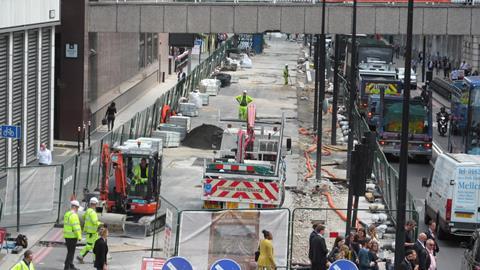A crackdown on late-running roadworks could cut congestion for millions of drivers and generate up to £100m extra funding to resurface roads, according to the government’s Plan for Drivers strategy, published today (15 January).
The plan sees Roads Minister, Guy Opperman launch a street works consultation on a series of measures to prevent utility companies from letting roadworks overrun with the aim of cutting road congestion.
The consultation seeks to extend the current £10,000 per day fine for overrunning street works into weekends and bank holidays as a deterrent for working on the busiest days for road travel.
Currently, utility companies are only fined for disruption on working days. By extending the measures the DfT claims the fines could double from £500 up to a maximum of £1,000 for companies that breach conditions of the job, such as working without a permit.
The plans also aim to direct at least 50% of money from lane rental schemes to be used to improve roads and repair potholes. Lane rental schemes allow local highway authorities to charge companies for the time that street and road works occupy the road.
As a result, the measures could generate up to £100m extra over 10 years to resurface roads while helping tackle congestion, cutting down journey times and helping drivers get from A to B more easily, the govrnment report claims.
Launching on National Pothole Day, the consultation is part of a series of measures from the government’s Plan for Drivers, which the government describes as ”a 30-point plan to support people’s freedoms to use their cars, curb over-zealous enforcement measures and back drivers.”
Transport Secretary, Mark Harper, said: ”After investing an extra £8.3bn to resurface roads across England, the largest ever increase in funding for local road improvements, this government continues to back drivers with these new measures from our Plan for Drivers.
”Our new proposals seek to free up our roads from overrunning street works, cut down traffic jams and generate up to £100m extra to resurface roads up and down the country.”
Roads Minister, Guy Opperman,added: ”Being stuck in traffic is infuriating for drivers. Too often traffic jams are caused by overrunning street works. This government is backing drivers, with a robust approach to utility companies and others, who dig up our streets.
”We will seek to massively increase fines for companies that breach conditions and fine works that overrun into weekends and bank holidays while making the rental for such works help generate up to an extra £100m to improve local roads.”
The DfT estimates that the two million street works carried out in England in 2022 to 2023 have cost the economy around £4bn by causing severe road congestion and disrupting journeys.
The consultation comes after the government introduced a performance-based street works regime to ensure utility companies resurface roads to the best possible standard, and new lane rental schemes where utility companies can be charged up to £2,500 per day for street works.
The DfT claimed the measures will also help boost active travel by preventing street works from disrupting walking, wheeling and cycling while also providing opportunities to improve pavements and pedestrian crossings and make repairs to pavements and cycle lanes.
Jonathan Walker, Logistics UK head of cities and infrastructure policy, gave a qualified welcome to the consultation. He said: “Congestion is a major cause of delays for the logistics industry, which ultimately leads to disruption and costs for businesses and consumers.
”Any measures that result in more efficient roadworks and fewer road closures are therefore positive and must be part of wider measures that improve the condition and reliability of the road network as a whole.”
Simon Williams,RAC head of policy, said: ”Drivers shouldn’t have to put up with temporary roadworks for any longer than is necessary, so we’re pleased to see the government is looking to do more to guarantee that utility companies minimise disruption by carrying out roadworks as quickly and efficiently as possible. They should also leave roads in better condition than they found them, which unfortunately is hardly ever the case at the moment.”
Clive Bairsto, Street Works UK chief executive, added: ”Utilities perform a vital role in connecting households, working to the highest standards, while complying with rigorous inspections to ensure works are high quality and lasting.
”We look forward to engaging constructively with government throughout this consultation, representing our members and the wider industry, to ensure both utilities and local authorities can deliver infrastructure works while giving customers and road users the speed of delivery, lack of congestion and transparency they expect.”














